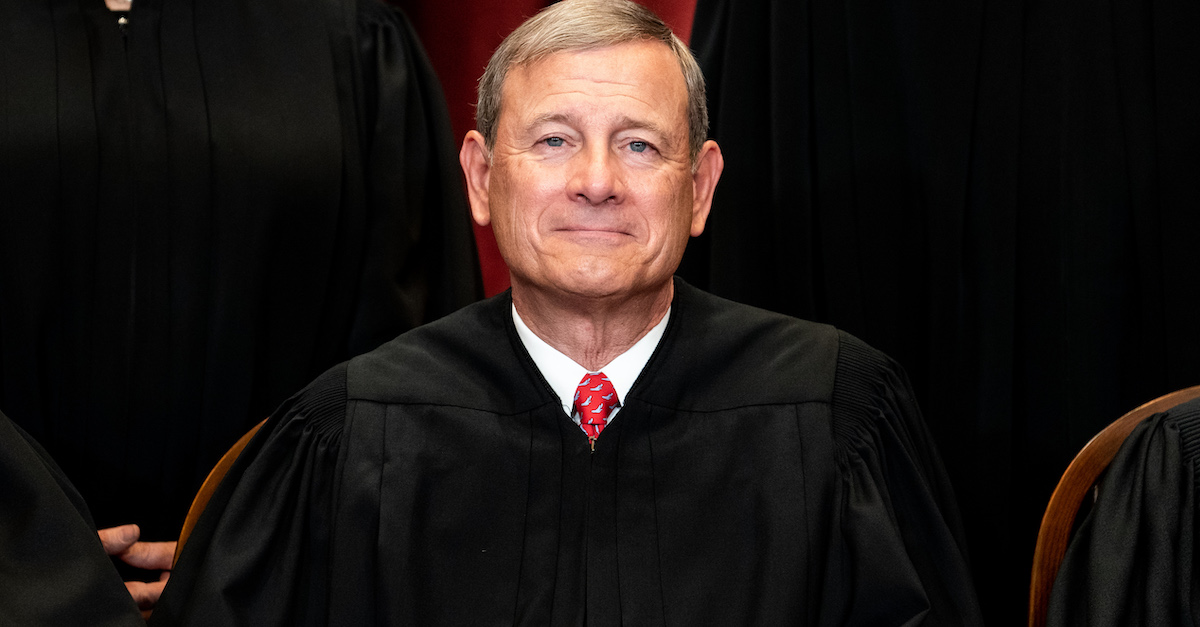
Chief Justice John Roberts is uninterested in hearing arguments against the mask mandate currently enforced on passengers who patronize U.S. airports and domestic airlines.
Michael Seklecki, the father of a 4-year-old autistic boy who is referred to in legal briefings as M.S., filed an emergency application for review of the mandate with the U.S. Court of Appeals for the D.C. Circuit in on Nov. 9. The lawsuit asked for a stay of the mandate and a preliminary injunction. The requests were denied by the appellate court in a per curiam order–without comment–the very next day.
Last Friday, the the boy and has father filed their request with the Supreme Court.
On Thursday, Roberts dismissed the request for emergency action from the nation’s high court–also without comment.
Somewhat confusingly, the Seklecki family members are not the lead plaintiffs in the lawsuit, stylized as Lucas Wall v. Transportation Security Administration. The filing docketed last week does, however, focus on their claimed plight of being unable to board an airplane flight booked for Dec. 9 due to the TSA’s mask mandate.
According to the emergency request, the boy “can’t wear a mask and must fly regularly for specialized medical care out of state.” The filing also claims the boy’s father “who also medically can’t tolerate wearing a face covering and must accompany M.S. on flights to Massachusetts and back for his son’s medical care.”
The Seleckis were seeking “a stay to immediately halt” the TSA’s enforcement of the mask mandate nationwide until both the court of appeals and the Supreme Court itself weighed in on the issue.
Here’s how they frame their claimed medical concerns:
My son M.S. has autism and several other severe medical conditions requiring specialized treatment at Boston Children’s Hospital in Massachusetts. We haven’t been able to find sufficient care for him here in Florida. Therefore we recently had to start flying regularly to Boston for his medical appointments. Being denied the right to fly because we can’t wear masks jeopardizes my son’s life as it’s not practical for us to make the lengthy drive to and from Boston every time he has a medical appointment. Should TSA be allowed to continue to mandate masks, my son could miss critical medical care, which could be fatal. My family and I would suffer enormous irreparable harm.
A similar lawsuit against those public health-oriented COVID-19 precautions was filed in Florida federal court in June by 44-year-old Lucas Wall, who claims to have generalized anxiety disorder which causes him to experience panic attacks and hyperventilation if his sources of oxygen are obstructed.
“He has been stranded at his mother’s house in The Villages, Florida, since early June because TSA won’t let him fly maskless even though he can’t medically cover his face,” the emergency order claims.
Wall also elaborated on his alleged medical issues with masking:
Due to my Generalized Anxiety Disorder, I have never covered my face. I tried a mask a couple times for brief periods last year, but had to remove it after five or so minutes because it caused me to instigate a feeling of a panic attack, including hyperventilating and other breathing trouble.
The petitioners asked for a response from the chief justice by Wednesday, Dec. 8 due to the time-sensitive nature of their request.
“M.S. and Mr. Seklecki have a flight booked on Delta Air Lines from Boston home to Orlando on Thursday, Dec. 9,” the brief notes. “Also, Mr. Wall has a flight booked Friday, Dec. 10, on United Airlines to Germany from Orlando to visit his brother and sister-in-law, whom Mr. Wall has been trying to visit since July but keeps getting denied by TSA and the airlines, who won’t grant mask exemptions to the disabled.”
Such expediency from Roberts ultimately did not occur.
The chief justice–who fielded the request based on the jurisdiction that governs such appeals–could have referred the matter to the entire group of nine justices. Instead, he chose to dismiss it outright.
[image via Erin Schaff-Pool/Getty Images]